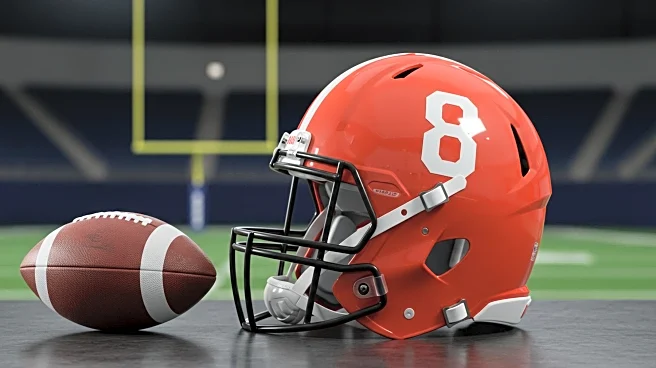What's Happening?
Baltimore Ravens quarterback Lamar Jackson has decided to withdraw his trademark challenge against former NFL quarterback Troy Aikman regarding the use of the number 8. Jackson initially filed the challenge in July 2024, contesting Aikman's trademark applications for the word 'EIGHT' on apparel and bags. Jackson's legal team argued that Aikman's use of the trademark could cause confusion among consumers, potentially misleading them into thinking they were purchasing Jackson's merchandise instead of Aikman's. The U.S. Patent and Trademark Office confirmed that Jackson filed to withdraw his challenge earlier this week. Aikman, who has several products under the 'EIGHT' brand, including a light beer, responded humorously to the initial challenge, suggesting a conversation over beers with Jackson.
Why It's Important?
The resolution of this trademark dispute is significant for both athletes' business ventures. For Lamar Jackson, withdrawing the challenge allows him to focus on expanding his Era 8 Apparel brand without the distraction of legal battles. This decision may also prevent potential consumer confusion in the marketplace, ensuring clarity between the two athletes' merchandise. For Troy Aikman, the withdrawal means he can continue to develop and market his 'EIGHT' branded products without legal hindrance. The case highlights the complexities of trademark law in sports merchandising, where athletes often seek to capitalize on their jersey numbers and personal brands.
What's Next?
With the trademark challenge withdrawn, both Jackson and Aikman can proceed with their respective branding strategies. Jackson may continue to apply for trademarks related to his Era 8 brand, potentially expanding his product line. Aikman can focus on promoting his 'EIGHT' brand, possibly exploring new product categories. The resolution may also encourage other athletes to carefully consider trademark strategies and potential conflicts in the sports merchandising industry.
Beyond the Headlines
This case underscores the growing importance of intellectual property rights in sports, where athletes increasingly leverage their personal brands for commercial gain. The dispute also reflects broader trends in the industry, where athletes are becoming more involved in business ventures beyond their sports careers. As athletes continue to build their brands, trademark conflicts may become more common, necessitating careful legal navigation.









